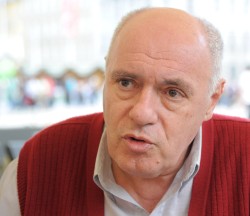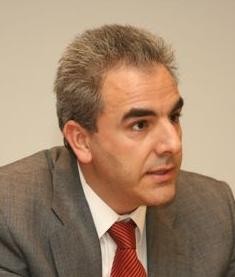Plenary panel 3: Addressing Political instability and Weak Institutions in South East Europe
Discussion Points:
- What will be the consequences of BREXIT for Southeastern Europe?
- How does the expected postponement of EU enlargement affect candidate countries in the region of the Balkans?
- What does the rise of illiberal tendencies in all countries of Southeast Europe mean for the region?
- What is to be the fate of weak state institutions in the region with the rise of a geopolitical struggle between Turkey, Russia and the European Union?
- How important are regional initiatives for the stability of Southeastern Europe?
Speakers:
Maciej Popowski‚ Deputy Director-General in the Directorate General for Neighbourhood and Enlargement Negotiations of the European Commission
Thanos Dokos‚ Director General, ELIAMEP
James Ker Lindsay‚ Eurobank Senior Research Fellow on the Politics of South East Europe, European Institute, London School of Economics and Political Science (LSE)
Remzi Lani‚ Executive Director, Albanian Media Institute
Žarko Puhovski‚ Professor, Faculty of Philosophy, University of Zagreb
Alida Vračić‚ Mercator Fellow, German Institute for International and Security Affairs/Stiftung Wissenschaft und Politik (SWP), Brussels/Berlin
Sinan Ülgen‚ Chairman, Centre for Economics and Foreign Policy Studies (EDAM)
Chair: Judy Dempsey‚ Carnegie Europe
Background
While Southeast Europe has come a long way since the turn of the century, it is still stuck in a constant loop of transition. Across the region, governments are still in the process of stabilizing after the events of the 1990s. Corruption, insufficiently developed state institutions and the instrumentalization of ethnic tensions remain at the pinnacle of the pyramid of problems plaguing the region.
Parliamentary elections in Serbia were moved up two years in order to speed up the process of possible integration into the EU and are not currently on a regular election schedule. In Bosnia and Herzegovina, for example, there are still two separate governments in control of almost totally separate areas. The Dayton Accords of 1995 effectively stopped the bloodshed of the Bosnian War but froze the unstable political situation and did little to set the country up for political growth and stability.
State-capture and weak rule of law still remain a threat for the further deepening of instability. The process of stabilizing the region politically relies on institutions that cannot function to their full extent with political and non-state actors intervening in the institution building process. This is evidenced, for example, in EU-member country Romania, where Prime Minister Victor Punta stepped down last year after protests in the streets after allegations of corruption.
EU enlargement has been a rocky road for Albania, Bosnia and Herzegovina, Kosovo, Macedonia, Montenegro and Serbia respectively. At various stages of the negotiation process, the countries now face an even bigger challenge after BREXIT, with European officials announcing an even longer period of waiting before enlargement. The main argument being that this divorce will consume considerable time and energy, the political elites in candidate states are now put before a task of explaining this postponement to their respective electorates.
Apart from the EU prospects of the candidate states being ever more difficult, new geopolitical players, namely Turkey and Russia are represent alternative models of government, which may be taken as examples of good practice for right wing nationalist elites in Southeastern Europe.
Economic interests of big players such as Russia and key European states, such as Germany all impact the sensitive balance of the region which is ever more burdened with issues such as migration, economic disparity and an ever growing brain drain.
——————————————————————-
Selected Readings:
- EU Integration and Party Politics in the Balkans
- Brookings Europe Foreign Policy Scorecard
- European Integration, Bosnia-Herzegovina and Stability in the Western Balkans: A New Strategy
- Western Balkans and Turkey: Enlargement Process Key to Strengthened Economic and Political Stability in the Region (European Commission Press Release, November 2015)
- Transforming the Balkans: Security, Political Stability and Economic Development (Center for Strategic and International Studies Panel Summary, May 2011)
- de Borja Lasheras, F., Tcherneva, V., Wesslau, F.; Return to Instability: How Migration and Great Power Politics Threaten the Western Balkans (ECFR, March 2016)
Previous BSF Panels and Sessions on political instability in Southeast Europe
2015
Session 1: Kosovo and Serbia – How Much Longer Before Normality?
The Berlin Process in Belgrade: The EU as a Peace Project Revisited in the Western Balkans
Plenary Panel 3: The Crisis in Ukraine—Lessons not Learned from the Western Balkans
Session 11: When Nations Move: The Failure of Migration Policies
Plenary Panel 4: Improving the European Model of Governance: Ways Forward
2014
Session 11: EU Enlargement: Picking up the Pieces?
Plenary Panel 2: The EU and its Peripheries
Evening Panel: Serbs and Albanians in 2025 as Friends and Allies: How Do We Get There?
Session 7: Will the Outcome of the Ukrainian Crisis Determine a New Path for Europe and Beyond?
Plenary Panel 4: Is it Time for a New Balkans Commission?
2013
Session 7: Serbia and Kosovo*: A Game Changer in the Balkans?








